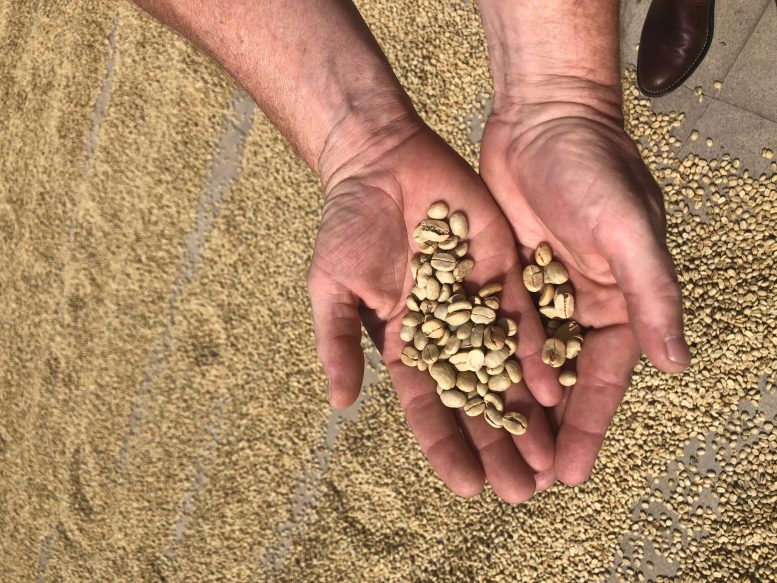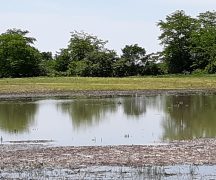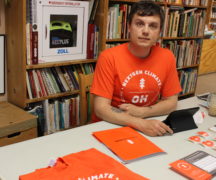By DAVID DUPONT
BG Independent News
Climate change may increase the cost of your morning coffee.
Kelly Wicks, who owns Grounds for Thought in Bowling Green with his wife, Laura, was quoted in a recent Business Forward report saying that climate change is “adversely affecting the long term outlook for coffee, putting additional burdens here at home and putting small farmers in potential financial peril in all the major growing regions worldwide.”
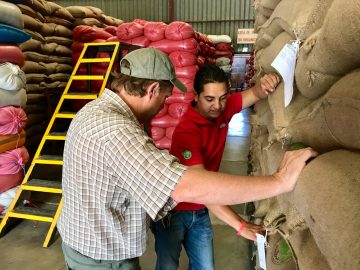
Kelly Wicks in warehouse in Nicaragua (Photo provided by Kelly Wicks)
Early this year, the Wicks family and a couple key employees traveled to the Siles Farm in Matagalpa, Nicaragua to get a first-hand look at how their main product is grown, and the challenges facing the farmers, small business owners like the Wicks family, who provide it.
Coffee growers, Wicks said, are battling “rust,” a pathogen that can have devastating effects on a coffee plantation. The disease thrives at warmer temperatures.
Even a temperature increase of a couple degrees can promote the disease and that can reduce the crop dramatically.
The Siles farm is large enough with several thousand acres, that the growers can, for now, combat the spread of the disease by moving production to higher elevations, where the trees are less susceptible. “They have some ability to combat the challenge from climate change,” Wicks said.
Siles also has its own dairy herd. The whey is used to produce a material to help protect the trees from rust. The milk is given to their employees.
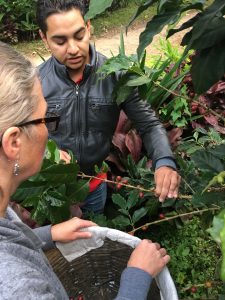
Laura Wicks gets instruction on picking coffee fruit. (Photo provided by Kelly Wicks)
“It’s small growers who have no option.” While Siles produces thousands bags a year, a small farmer may produce 20-30 bags. “They can’t say we’re just going to go up the mountain,” he said. “And if their well runs dry, they’re out of luck.”
While rust is a problem wherever coffee is grown, it is a particular issue in Central America. Should the region’s coffee crop be devastated, that would put a million people out of work, Wicks said.
Coffee harvesting and processing is still a labor intensive process, Wicks said. “It’s labor intensive hands-on commodity.”
The crew from Grounds got to experience that first hand, getting up before dawn to head out to pick the fruit that contains the beans from the trees. They did so under the watchful eye of the experienced hands at Siles Farms. The coffee fruit that look like mini crab apples, must be picked one by one since they ripen at different rates. And this highlights another problem posed by climate change. It is extending the growing season by as much as 30 days. That means more labor for a smaller crop.
Once the pods are harvested, they go through a machine that separates seed from fruit. From there, the beans undergo initial fermentation for 24 hours. After that they may or may not be washed. A farmworker will run his hands through the beans to determine whether enough of the sticky residue from the fruit has been removed. The Siles farm is a big enough operation to maintain these facilities on site. Small farmers will sell their beans and have a processor do the job.
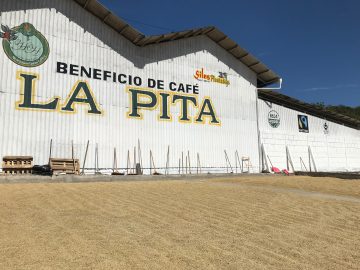
Beans drying at warehouse. (Photo provided by Kelly Wicks)
Siles Farm ships its beans to a dry mill in nearby Matalgalpa. The beans are spread out on a screen on a patio to dry. Once the moisture level is cut from about 50 percent to 16 percent or so, the beans are cleaned of any debris and sorted by color and size. Then some are roasted and brewed to assess their characteristics. Then they are bagged.
Wicks said at this point, the lower quality beans that account for most coffee have not been severely affected. So the overall the supply and price is steady.
However, he said, “the top grade stuff that Grounds and other top roasters want is getting more expensive.”
The environmental changes in these regions, he said, threaten more than coffee. These regions also grow bananas, coconut, macadamia nuts, and sugar.
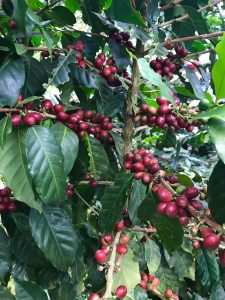
Coffee fruit on tree. (Photo provided by Kelly Wicks)
Climate change is more than a warming temperatures. “It’s the irregularity of the weather patterns,” he said.
Climatologists have also pointed to the increase in severe weather because of warming.
So Ethiopia, he noted, “is in throes of worst drought in the history of the country.” In Java the rainy season was 30 days longer, and that ruined 70 percent of that country’s crop. “Those are the irregularities that can put undue pressure on small farmer who are small business owners.”

